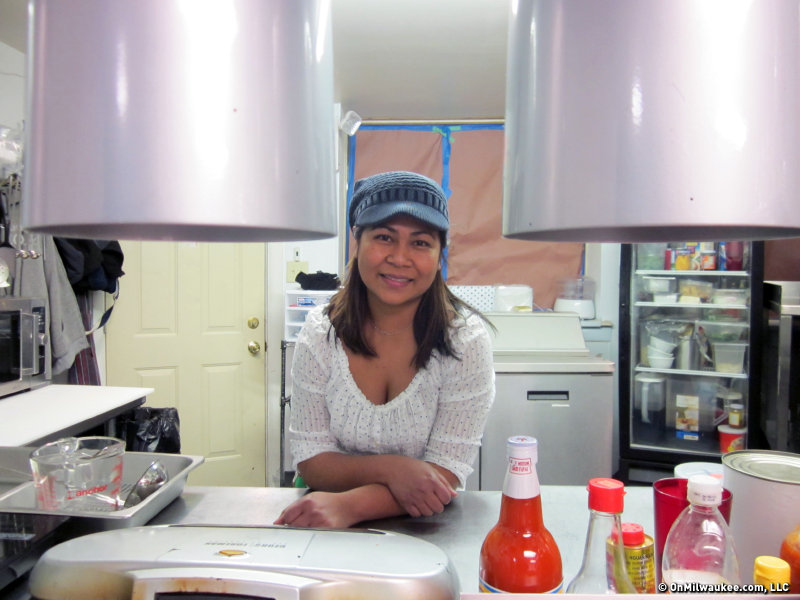The funky little storefront with the yellow striped awnings, pushed up against a house, on the corner of Farwell and Lafayette has been an East Side landmark for more than a generation. Abu's Jerusalem of the Gold served its hummus, shawarma and rosewater lemonade in a tiny diner since the 1970s.
Hippies, hipsters, Middle Easterners and the gastronomically curious squeezed into the space or were part of Abu's sizable carryout business. The restaurant was an eye-catching constant on a street that has experienced considerable change over more than three decades.
Wander into the location now, and you will be shocked. Spring rolls and chicken satay have replaced pita and baba ghanouge. The interior has been remade with a sleekly stylish look, and a fully stocked bar has been added.
Welcome to Jow Nai Fouquet, a new Thai restaurant with home cooking but a contemporary vibe. Aom Nueakaew, who comes from a family of restaurateurs in Thailand, is the owner, chef, and may even be your server if you are at the cafe on a slow night. She emigrated from Thailand nearly seven years ago, and after waiting tables and serving as a manager at Sticky Rice in Racine for five years she went looking for a Milwaukee location of her own.
Jow Nai Fouquet had a soft opening in November and is refining its menu before setting a grand opening date. Pyte Khampane, who was born in Laos of Lao-Thai parents and raised in West Allis, is heavily involved as a consultant. A partner in Sticky Rice, he learned the restaurant business at Bangkok Orchid and Thai's Joe's in the old Prospect Mall.
Khampane is contributing the start-up expertise and familiarity with the East Side for the new cafe while Nueakaew provides the recipes and her kitchen savviness.
The owner-chef grew up in southern Thailand, and Jow Nai Fouquet reflects that region's cuisine, which favors seafood and curries. Red and green sea curries ($13.50) contain shrimp, scallops and squid with a variety of different ingredients – eggplant, baby corn, mushrooms, carrot, green beans, bell peppers, bamboo, pineapple and Thai sweet basil. Customers can choose the level of heat they want in the spices.
In addition to the standard Thai dish volcano chicken ($9.50), Jow Nai Fouquet offers volcano fish ($9.95) and volcano shrimp ($12.50). Ginger fish (deep fried tilapia) in a house sauce with Thai herbs is $12.50, and steamed mussels with lime juice, garlic and chilies costs $8.50.
Other curry dishes include a yellow with mild slow-cooked chicken, potatoes, carrots and onions, and a red with slightly spicy chicken or pork, bamboo, bell peppers, onions, carrots, pineapple and sweet Thai basil (both $9.50). A vegetarian variation ($9.95) features tofu and is offered with red, yellow or green curries. Once again, the diner can pick the degree of hotness.
A vegetarian section of the menu includes vegan volcano and a noodles basil pan, both $9.50. They come with tofu or a meat substitute.
Such common Thai items as Thai basil beef ($9.50) and several noodle entrees are also offered.
"I talked my aunt into giving me the recipe," Nueakaew said during a recent interview. "I promised not to tell anyone, and I promised I wouldn't go back (to Thailand) with it." The dish is on the menu for $8.50.
Jow Nai Fouquet's small bar seats five or six, and it offers a selection of Asian beers as well as Red Stripe, Blue Moon, Fat Tire and others. Among cocktails, all priced at $7, Nueakaew's specialties are a Mai Thai and a pina colada.
The bar is the focal point of a rather startling transformation of the building's interior look created by Dominic Heisdorf, who studied industrial design at Brooklyn's Pratt Institute. "We wanted to create the effect of having a larger space than what is actually here," Jow Nai consultant Khampane explained. "We wanted it to feel personal and comfortable."
Heisdorf had previously designed furniture that was built by his friend, cabinetmaker and carpenter Kyle Safranek. That partnership is responsible for a continuous sweep of painted and stained birch that begins at the restaurant's door and continues as a bench under the Farwell Avenue windows, around a south wall and culminates in the three-sided bar.
Textured and grooved, in long lines and geometric shapes, the piece blends contemporary with art deco in shades of natural wood and pastel blue colors. It measures about 48 feet in length and was built by Safranek in his Cream City Woodworks workshop.
Heisdorf, who has previously created murals for the I Dream of Falafel restaurant chain in Chicago, painted the walls in muted shades of blue-gray and yellow with a subtle graphic of an orchid. Safranek installed teak laminate flooring.
Jow Nai built a single restroom much larger than Abu's and moved the kitchen down a few steps into a space that was formerly an apartment. "We had to dig a 4-ft. hole to get the plumbing connection for the kitchen," Khampane said.
Twenty persons can be seated in the dining room, and the eatery will have outdoor tables in the summer. It encourages carry-out business and will add scooter delivery in the spring.
The cafe is named after Nueakaew's 2-year-old son. Jow Nai means royal blood, and in common usage can be translated as "the boss" or "the big kahuna."
Fouquet is a bit of an homage to the legendary Paris restaurant Fouquet's. Khampane is a francophile and has relatives living in France. His native Laos was once part of the French colonial empire.
He talked Nueakaew into adding Fouquet to the name. The excellence of the Parisian restaurant gives the new East Side cafe a level for which it can strive.
Jow Nai Fouquet is closed Tuesdays and serves lunch only on Thursdays and Fridays. It accepts carry-out orders up to an hour after the dining room closes, which is 10 every night except Friday and Saturday, when it stays open to 11 p.m.
Damien has been around so long, he was at Summerfest the night George Carlin was arrested for speaking the seven dirty words you can't say on TV. He was also at the Uptown Theatre the night Bruce Springsteen's first Milwaukee concert was interrupted for three hours by a bomb scare. Damien was reviewing the concert for the Milwaukee Journal. He wrote for the Journal and Journal Sentinel for 37 years, the last 29 as theater critic.
During those years, Damien served two terms on the board of the American Theatre Critics Association, a term on the board of the association's foundation, and he studied the Latinization of American culture in a University of Southern California fellowship program. Damien also hosted his own arts radio program, "Milwaukee Presents with Damien Jaques," on WHAD for eight years.
Travel, books and, not surprisingly, theater top the list of Damien's interests. A news junkie, he is particularly plugged into politics and international affairs, but he also closely follows the Brewers, Packers and Marquette baskeball. Damien lives downtown, within easy walking distance of most of the theaters he attends.






